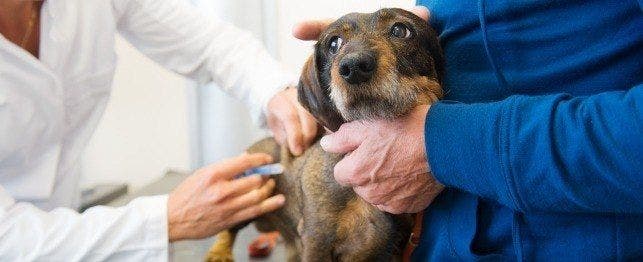
Why Should I Vaccinate My Dog?
A vaccination is the introduction of vaccine into the body to produce immunity to a specific disease. At this time, the majority of vaccines are made to combat viruses.
Prior to vaccines, people and pets frequently died from viral infections. Through scientific advancement and understanding of viruses and the immune system, vaccines have been developed. Since the advent of vaccines, death due to viruses that have a vaccine available has significantly declined.
When a normal, healthy puppy is born, his immune system is considered naïve; it has not been exposed to foreign substances or viruses. Through his mother's milk, the puppy will gain some immunity from those viruses his mother is protected against. Unfortunately, this maternal immunity is temporary. In the first 5 to 6 weeks of life, the mother's antibodies are sufficient to keep the puppy immune from most common viruses. At about 5 to 6 weeks, this immunity begins to wane. By age 20 weeks, the maternal antibodies are gone and the puppy must now rely on his own immune system to fight off viruses. Without prior exposure to a specific virus, his immune system can rapidly become overwhelmed as the live, active virus takes over.
The purpose of vaccination is to prepare and arm his immune system for the time when it will be exposed to certain viruses. Vaccination prepares his immune system for an invasion and results in rapid destruction of virus and maintains the health of the dog.
Without vaccination, the dog must be exposed to and survive the viral attack in order to develop immunity from future invasions. Vaccination bypasses this by exposing the dog to disabled or killed virus. This results in stimulation of the immune system as though a live virus has invaded but the dog does not get ill. Now, the immune system is prepared for future viral attacks.
During the first few months of life, a series of vaccinations is required. The reason is related to maternal antibodies. After a vaccination is given, the maternal antibodies attack the virus particles and destroy it. As the puppy ages, these maternal antibodies become weaker and are unable to destroy the vaccine. At this point, the vaccine is allowed to stimulate the puppy's immune system and result in immunity. Unfortunately, it is not known for each puppy when the maternal antibodies are no longer effective. At some point between age 6 weeks to 20 weeks, the maternal antibodies are no longer protective. Since there is uncertainty, vaccination every 3 weeks is considered the safest way to ensure at least some protection to the puppy. After 20 weeks of age, maternal antibodies are gone and the puppy can now be vaccinated less frequently.
It is not recommended to wait until the puppy is 20 weeks of age to vaccinate. This can result in serious viral infections and even death.
The vaccines currently available in the United States for dogs are:
- Parvovirus
- Distemper
- Adenovirus
- Leptospirosis
- Parainfluenza
- Lyme
- Bordetella
- Rabies
- Corona